Contents
The inability to distinguish between seedlings of different plants is a fairly common problem not only for beginner gardeners, but also for experienced gardeners. This is especially true for seedlings of plants belonging to the same family. Landing markings largely help to avoid this unpleasant situation, but even they can let you down: get lost or be blown away by the wind. That is why knowing the obvious differences between seedlings of often confused plants will not be superfluous. In this article, we will look at the most similar representatives of the Pumpkin family: zucchini and pumpkin.
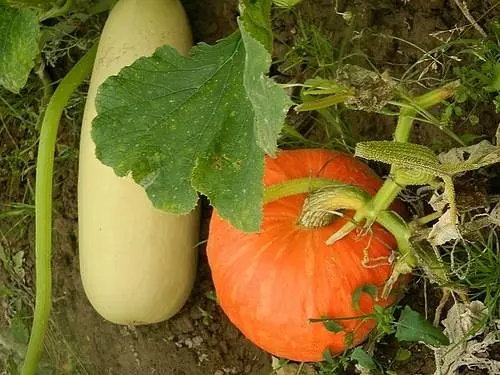
The benefits of zucchini and pumpkin
In terms of benefits, there are no significant differences between them. Both vegetables are incredibly healthy. They have a very rich composition, which includes the main vitamins and minerals:
- vitamins A and C;
- vitamins of groups B and P;
- potassium;
- phosphorus;
- calcium;
- copper;
- iron and others.
Both of these cultures are able to have a strong positive effect on the body. Due to their natural polysaccharide – pectin, they have a preventive and therapeutic effect on the gastrointestinal tract.
Of all the vegetables that are most often grown in garden beds, these crops are the most low-calorie and healthy. In addition, they are approved for use in the nutrition of babies from one year old.
The only difference between them is in the cooking methods. Zucchini is most often used for cooking and preparations. Pumpkin shows itself best in desserts and sweet cereals.
Differences between pumpkin and zucchini
Despite the fact that both cultures belong to the same Cucurbitaceae family and they have quite a few common characteristics, there are also differences between them.
Distinctive features of pumpkin:
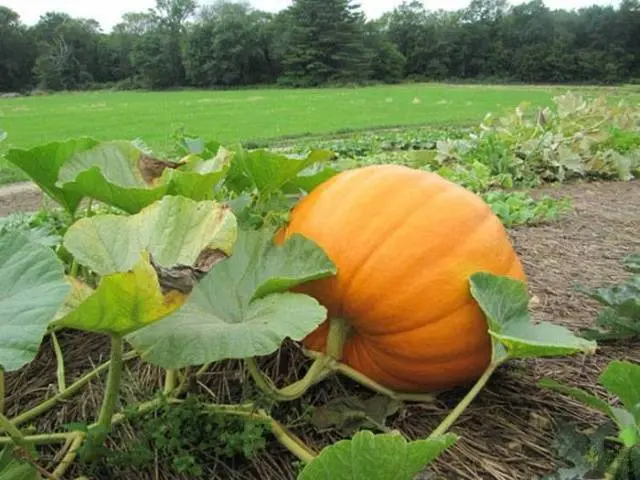
- plants produce powerful and long lashes. Unlike squash plants, they require mandatory formation;
- pumpkin is most often round in shape. Although such varieties of pumpkins have also been bred that have an oblong shape, which is very reminiscent of a zucchini;
- the color of the skin and pulp of a ripe pumpkin is orange, less often gray;
- they begin to ripen closer to mid-August, but the peak of their ripening occurs in the autumn months;
- pumpkin fruits have a hard layer under the skin, which can also be eaten;
- pumpkin fruits have a sweeter taste and a strongly pronounced aroma than zucchini fruits.
Distinctive features of zucchini:
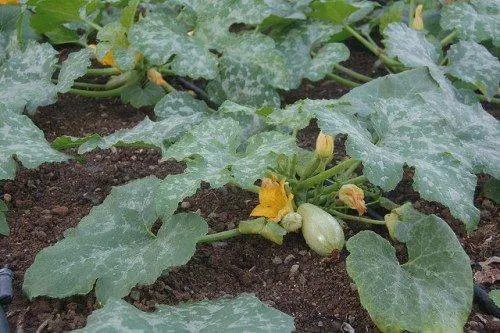
- plants have the shape of a bush and only occasionally let out lashes, the size of which will be smaller than that of pumpkin plants;
- they have an elongated oval shape, but the fruits of some varieties have a pumpkin round shape;
- their color, unlike pumpkins, is more diverse: they can be yellow, green and even striped;
- bushes bear fruit all summer until the first autumn frosts;
- the pulp is homogeneous, it has a fresh taste without a pronounced smell.
Differences between zucchini seeds and pumpkin seeds
There are cases when the seeds of these vegetables bought in specialized stores during storage, crumble and mix with each other. Or the gardener independently prepared the seeds of these crops and did not sign them. You can, of course, plant seeds at random, but when planted together, zucchini and pumpkin can dust each other and give a poor harvest. Anyone who has never planted pumpkins and zucchini in their summer cottage will offer to simply disassemble the seeds. But experienced gardeners are well aware that it is not so easy to distinguish between the seeds of these crops – outwardly they are almost identical to each other, although they have a number of features.
Distinctive features of zucchini seeds:
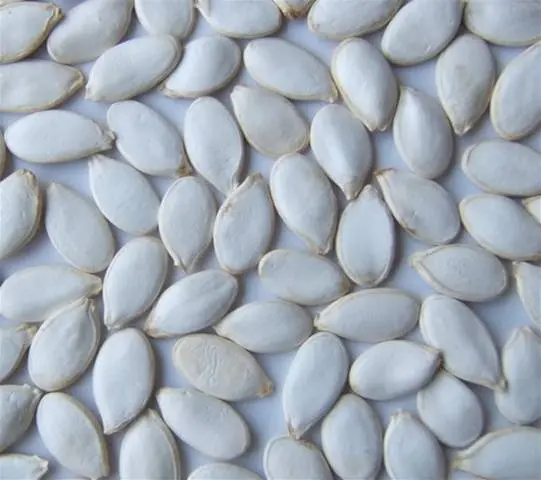
- their seeds have a more elongated oval shape;
- seed skin is thin and easily damaged;
- seeds have a milky white color without a yellow tint;
- squash seed breaks into 2 halves when pinched between the fingertips.
Compared to zucchini seeds, pumpkin seeds:
- have a more rounded shape;
- their skin is rougher and denser; the seeds are painted in a pale yellow color;Important! There are some varieties of pumpkin, the seeds of which are no different in color from zucchini seeds.
- their seeds are not so easy to split into 2 halves by pinching between the fingertips;
- pumpkin seeds are larger in size than squash;
- they have a faster germination unlike zucchini seeds.
All these signs will help to disassemble the mixed seeds, but they will not give an absolute guarantee. Therefore, if it is impossible to select one seed from another, it is recommended to plant zucchini and pumpkin in seedlings. This is done in order to prevent the neighborhood of these crops on the same bed.
How to grow seedlings of zucchini and pumpkin
Before planting zucchini and pumpkin seeds for seedlings, they must be processed. Most gardeners follow the standard scheme:
- Selection of seeds suitable for sowing.
- Soak.
- Warming up
- Hardening.
Such seeds are planted immediately in the soil, without any procedures.
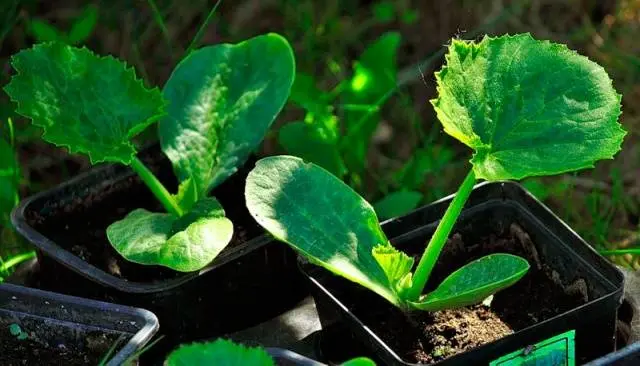
Both crops are very sensitive to the acid level of the substrate, so the ground for seedlings should be taken either slightly alkaline or neutral. Most often, peat diluted with humus, soddy soil and sawdust is used for seedlings. Before planting seeds, the prepared land must be disinfected with boiling water or a weak solution of potassium permanganate.
For planting these crops, do not use large containers. It is best to take separate pots or cups and plant 1 to 3 seeds in them. The weakest shoots must then be removed, leaving only one strong one. Seeds are buried in the ground by 2 centimeters, while they must be placed strictly horizontally. Planted seeds are covered with polyethylene or glass and placed in a warm place with a temperature of 20 to 22 degrees.
Seedlings hardened in this way will not stretch even with a lack of lighting.
Watering the seedlings of these crops is carried out with settled warm water as the top layer of the earth dries. Fertilizer of young seedlings before planting in a permanent place is carried out only 2 times:
- After 7-10 days from emergence, young plants are fertilized with mullein or urea and superphosphate. No more than half a glass of fertilizer should be used per pot.
- After 7 days from the first feeding, young plants are fertilized with nitrophoska. By this time, only the strongest sprout should remain in the cups, so the fertilizer consumption rate will be one cup per pot.
Ready seedlings are planted on a permanent place of growth not earlier than a month from the moment of seed germination. If they are planted in open ground, then planting should be carried out only after the end of frost, namely in late May – early June.
Video on how to plant these crops for seedlings:
Differences between zucchini and pumpkin seedlings
As with seeds, this way of distinguishing between zucchini and pumpkin plants is not a XNUMX% guarantee. But in most cases, this is how you can sort one seedling from another.
Signs of zucchini seedlings:
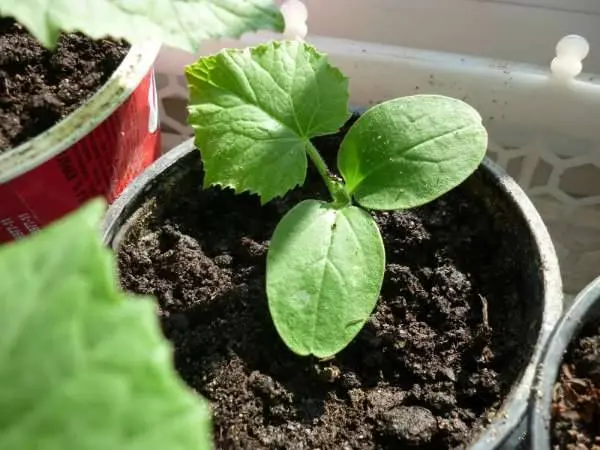
- in squash plants, cotyledon leaves have a more elongated, long shape than in squash seedlings;
- the first true leaf of their young plants is very thin with a carved surface;
- the stem of the seedling is quite long and is colored pale green.
Signs of pumpkin seedlings:
- young pumpkin plants have a thick and short stem;
- both the stem and the leaves of the seedlings are painted in a rich dark green color;
- pumpkin leaves are larger than the leaves of squash plants. In addition, they are very rough and dense in texture.
These differences in both seeds and seedlings of these crops have common features. Depending on the variety, the distinctive features of plants may vary, for example, a pumpkin will grow in a bush and have a delicate green color of seedlings, or zucchini plants will creep along the garden and have rough sheets. Therefore, the surest way to distinguish zucchini from pumpkins will be harvesting – it will already be clear where the fruits are.









